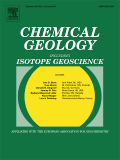
CHEMICAL GEOLOGY
Scope & Guideline
Fostering Excellence in Geochemical Science and Scholarship
Introduction
Aims and Scopes
- Geochemical Processes in Geological Materials:
The journal emphasizes research on the geochemical composition and processes of various geological materials, including minerals and rocks. This includes studying the chemical interactions between these materials and fluids. - Isotope Geochemistry and Dating Techniques:
A significant focus is placed on the application of isotopic techniques for dating geological events and processes. This includes U-Pb, Rb-Sr, and Lu-Hf dating methods, which help in understanding the timing and evolution of geological formations. - Environmental Geochemistry:
The journal explores the geochemical aspects of environmental issues, such as contamination, nutrient cycling, and the geochemistry of groundwater and surface water. This includes studies on the impacts of human activity on geochemical cycles. - Mineral Formation and Alteration:
Research on mineral formation processes, including crystallization, dissolution, and alteration, is a core component. This encompasses experimental studies that simulate natural processes to understand mineral behavior. - Geochemical Modeling:
The journal publishes studies that involve geochemical modeling to understand complex geological systems. This includes thermodynamic modeling and simulations of fluid-rock interactions and mineral stability. - Petrochemistry and Magmatism:
There is a consistent focus on the geochemical processes involved in magmatism, including the formation and evolution of igneous rocks, and the interactions between magmas and their surrounding environments.
Trending and Emerging
- Advanced Isotope Geochemistry:
There is a growing emphasis on the application of advanced isotopic techniques, such as clumped isotope analysis and multi-isotope approaches, to understand complex geological processes and environmental changes. - Climate Change and its Geochemical Impacts:
Research linking geochemistry to climate change is on the rise. This includes studies on how geochemical cycles are affected by climate variations, and the historical record of climate change preserved in geological materials. - Microbial Geochemistry:
The role of microbes in geochemical processes is gaining attention, particularly in relation to mineral weathering and biogeochemical cycling. Studies are increasingly focusing on how microbial activity influences elemental mobility and mineral formation. - Geochemical Modeling and Simulations:
There is an increasing trend towards using geochemical modeling and simulations to predict mineral behavior and fluid interactions under various conditions, reflecting a more quantitative approach to geochemical research. - Nanogeoscience and Nanoscale Processes:
Research exploring geochemical processes at the nanoscale is emerging, focusing on how nanoscale interactions influence larger geological and environmental systems.
Declining or Waning
- Traditional Geochemical Analysis Techniques:
There seems to be a waning interest in traditional geochemical analysis methods that do not incorporate advanced technologies. As newer methods such as laser ablation and high-resolution isotopic analyses gain traction, classical techniques may be overshadowed. - Generalized Environmental Studies:
Research that broadly addresses environmental geochemistry without specific focus on local or detailed case studies appears to be decreasing. There is a shift towards more precise studies that utilize advanced methodologies to address specific environmental issues. - Basic Mineralogy Studies:
There is a noticeable reduction in publications focused solely on basic mineralogical descriptions without geochemical implications. The trend is moving towards integrating mineralogy with geochemical processes and environmental impacts.
Similar Journals
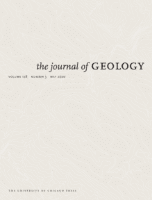
JOURNAL OF GEOLOGY
Charting New Territories in Geological Research.The JOURNAL OF GEOLOGY, published by University of Chicago Press, serves as a premier platform for disseminating groundbreaking research in the field of geology. Established in 1973, this esteemed journal has consistently ranked in the Q2 category in geology, further solidified by its Scopus ranking, where it is positioned at 99 out of 321 in Earth and Planetary Sciences, marking it in the 69th percentile of its category. With an emphasis on innovative and interdisciplinary studies, the journal features peer-reviewed articles that contribute to the understanding of geological processes, earth materials, and environmental interactions. Although it does not currently offer open access, it facilitates broad access through academic institutions to reach a global audience of researchers, professionals, and students striving to advance the knowledge of Earth's history and dynamics. As a vital resource for the geology community, the JOURNAL OF GEOLOGY plays an essential role in fostering scholarly dialogue and advancing both academic inquiry and practical applications in geology.
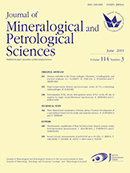
Journal of Mineralogical and Petrological Sciences
Exploring the Depths of Earth’s TreasuresThe Journal of Mineralogical and Petrological Sciences, published by the Japan Association of Mineralogical Sciences, serves as a vital platform for disseminating high-quality research in the fields of mineralogy and petrology. With a presence in both traditional and digital formats (ISSN: 1345-6296; E-ISSN: 1349-3825), this journal fosters scholarly engagement and innovation within these crucial branches of Earth Sciences. As evidenced by its Q3 ranking in both Geology and Geophysics categories for 2023, Journal of Mineralogical and Petrological Sciences maintains a significant standing within the academic community, contributing to the ongoing discourse and exploration of mineralogical phenomena and processes. Researchers, professionals, and students alike will find valuable insights and advancements represented within its pages, with a commitment to inclusivity in research output spanning two decades (2000-2024). Although not currently open access, the journal remains a key resource for understanding the complexities of our geological world.
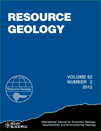
RESOURCE GEOLOGY
Decoding the Interplay of Geology and ResourcesRESOURCE GEOLOGY, published by WILEY, is a peer-reviewed journal that serves as a vital platform for the dissemination of innovative research in the fields of geology and geochemistry. With an ISSN of 1344-1698 and e-ISSN 1751-3928, the journal has steadily contributed to the academic community since its inception in 1996, continuing through its planned convergence in 2024. With a Q3 ranking in both Geochemistry and Petrology and Geology categories, RESOURCE GEOLOGY is positioned within the competitive landscape of Earth and Planetary Sciences, ranked 164th and 93rd in its respective categories on Scopus, reflecting its significant contribution to the body of knowledge in these fields. While not an open-access journal, it provides access to essential research that advances our understanding of natural resources and geological processes. The journal is dedicated to publishing high-quality articles that appeal to researchers, professionals, and students looking to deepen their insight into the intricate interplay between geological phenomena and resource management.
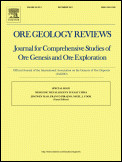
ORE GEOLOGY REVIEWS
Disseminating Cutting-Edge Geological DiscoveriesORE GEOLOGY REVIEWS is a premier academic journal published by Elsevier, renowned for its influential contributions to the fields of Economic Geology, Geochemistry, and Petrology, and Geology. With its esteemed Q1 ranking across these disciplines in 2023, it occupies a leading position in shaping scholarly discussions and advancements within the geological sciences. With an impressive Scopus ranking—47th in Earth and Planetary Sciences for Geology, and among the top 40 in Geochemistry and Petrology—this journal serves as an essential resource for researchers, professionals, and students committed to advancing knowledge in ore geology. Having transitioned to an Open Access model in 2022, ORE GEOLOGY REVIEWS enhances the accessibility of high-quality research, promoting wider dissemination and engagement with cutting-edge findings from 1986 to 2024. As a valued publication addressing the intricacies of ore deposits and geochemical processes, it aims to foster interdisciplinary collaboration and innovation in the field.
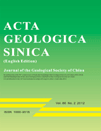
ACTA GEOLOGICA SINICA-ENGLISH EDITION
Pioneering Discoveries in Geology and BeyondACTA GEOLOGICA SINICA-ENGLISH EDITION is a distinguished academic journal published by Wiley, providing a platform for cutting-edge research in the field of geology. With an ISSN of 1000-9515 and E-ISSN 1755-6724, this journal has been a pivotal resource since its inception in 1988, catering to scholars and professionals until 2024. The journal is recognized for its high-quality articles, achieving a Q2 ranking in the field of Geology according to the 2023 category quartiles, and ranks #122 out of 321 in the Scopus Earth and Planetary Sciences sector, placing it within the 62nd percentile among its peers. Although currently not available as an open access publication, it remains a significant repository of knowledge that supports ongoing geological research and exploration. For researchers, students, and professionals looking to deepen their understanding of geological sciences, ACTA GEOLOGICA SINICA-ENGLISH EDITION stands as an essential journal, promoting collaboration and innovation in the earth sciences.

MINERALOGICAL MAGAZINE
Connecting Scholars to the Heart of MineralogyMINERALOGICAL MAGAZINE, published by Cambridge University Press, is a distinguished journal dedicated to advancing the field of mineralogy and its related disciplines, including geochemistry and petrology. With its ISSN 0026-461X and E-ISSN 1471-8022, this quarterly journal has successfully carved a niche since its inception, contributing critical research and insights from 1969, with ongoing publications up to 2024. Holding a commendable Q2 ranking in the field, it currently occupies the 61st position among 154 journals in its category, reflecting its robust influence as measured by Scopus rankings at the 60th percentile. Scholars and researchers seeking to publish impactful findings in earth sciences will find MINERALOGICAL MAGAZINE an essential platform that not only supports rigorous research but also fosters global discourse within the mineralogical community. Its accessibility ensures that valuable insights reach a wide audience, solidifying its position as a beacon for professionals and students alike in understanding the complexities of mineral compositions and their broader implications on earth science.

CONTRIBUTIONS TO MINERALOGY AND PETROLOGY
Exploring Earth’s Secrets Through Rigorous ResearchCONTRIBUTIONS TO MINERALOGY AND PETROLOGY, published by SPRINGER, is a premier journal in the fields of geochemistry, petrology, and geophysics, boasting an impressive impact factor that reflects its status as a leader in the discipline. With a history spanning from 1966 to 2024, this journal has consistently provided a platform for high-quality research that influences our understanding of earth materials and processes. Ranked in the top quartile (Q1) in both geochemistry and petrology, as well as geophysics, it stands out with Scopus rankings of #24 out of 165 in Geophysics and #37 out of 154 in Geochemistry and Petrology, indicating its critical role in advancing scientific knowledge. As a vital resource for researchers, professionals, and students alike, the journal invites contributions that foster collaboration and innovation in the study of minerals and rocks. Although it does not currently offer open access, its scholarly rigor and relevance to contemporary issues ensure it remains an indispensable part of the academic discourse within this field.

Minerals
Advancing mineral sciences for a sustainable future.Minerals, an esteemed open-access journal published by MDPI, has been at the forefront of advancing knowledge in the fields of geology, geotechnical engineering, and engineering geology since its inception in 2011. With an E-ISSN of 2075-163X, this journal aims to foster innovative research and disseminate critical findings that influence both academia and industry practices. Based in Switzerland, Minerals has made significant strides in its impact, evidenced by its 2023 Scopus rankings placing it in the 74th percentile in Geology and 63rd percentile in Geotechnical Engineering. The journal, which will continue to publish until 2024, encourages submissions that explore the multifaceted aspects of mineral sciences, highlighting the importance of sustainable practices and advancements in technology. Researchers, professionals, and students are invited to engage with this vital resource, which not only contributes to the expansion of geological knowledge but also supports the global understanding of mineral resources.

Geochemical Perspectives Letters
Pioneering insights into our planet's geochemical mysteries.Geochemical Perspectives Letters, published by the European Association of Geochemistry, is a leading open-access journal that has been at the forefront of geochemical research since its inception in 2015. Based in France, this journal is dedicated to disseminating high-quality, original research and reviews across the fields of Environmental Chemistry, Geochemistry, and Petrology, and Geology. With an impressive Q1 ranking in multiple categories, and notable Scopus rankings placing it among the top-tier journals in Earth Sciences, Geochemical Perspectives Letters aims to foster scientific dialogue and collaboration among researchers and professionals. Its open-access model ensures widespread dissemination of knowledge, making it accessible to a diverse audience, including students and seasoned experts alike. As the journal continues to converge research insights from 2015 to 2024, it remains a pivotal resource for those striving to understand and address the complexities of our planet's geochemical processes.
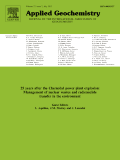
APPLIED GEOCHEMISTRY
Unraveling the Complexities of Earth’s Chemical InteractionsApplied Geochemistry is an esteemed peer-reviewed journal published by Pergamon-Elsevier Science Ltd, dedicated to advancing the field of geochemistry by exploring the intricate relationships between geological processes and environmental chemistry. With a significant impact factor and prestigious standing in various categories, including Environmental Chemistry, Geochemistry and Petrology, and Pollution, Applied Geochemistry is classified within the Q2 quartile, reflecting its influence and recognition in the scientific community. The journal spans research contributions from 1986 to the present, focusing on critical issues such as the impact of geochemical processes on the environment, the evaluation of pollution sources, and innovative methodologies in geochemical analysis. Through its rigorous publication standards, Applied Geochemistry serves as a vital resource for researchers, professionals, and students seeking to enrich their understanding of geochemical phenomena and their implications for environmental health. Please note that access to the journal is not open; therefore, institutional or individual subscriptions may be required for full-text viewing.